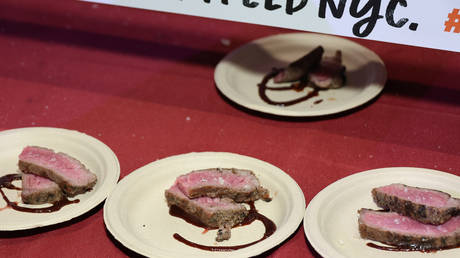
Brussels claims certain foods and drinks contribute to cancer, and, hence, shouldn’t be promoted
Hungary is finding the European Commission’s anti-cancer plan hard to stomach, as it seeks to prohibit the promotion of red meat and wine, among other measures to reduce risk of the disease.
Speaking to the media in the Belgian capital on Monday, state secretary of the Hungarian agriculture ministry, Zsolt Feldman, described Brussels’ push as “unacceptable,” claiming that the European Commission “is not seeking solutions.” The official went on to argue that restricting the promotion of red meat and wine “will not promote healthy lifestyles or sustainability.”
Feldman also noted that societies should be allowed to “shape their own dietary habits without artificial methods invented by bureaucrats in Brussels.” According to him, the EU “has more and more initiatives based on ideologies rather than supported by impact studies.” Feldman added that Hungary was not alone in its opposition to Brussels’ crusade against red meat and wine, with 19 more European nations taking issue with it.
If the state secretary of the Hungarian agriculture ministry is to be believed, the measures proposed by Brussels could backfire badly, with “food production being shifted to third countries, jeopardizing the security of supplies to the EU.”
Dubbed ‘Europe’s Beating Cancer Plan’, the European Commission’s brainchild envisages the introduction of warning labels on alcoholic beverages including wine, similar to the ones printed on cigarette packs. On top of that, red and processed meats will be excluded from the EU’s agricultural promotion programs, apparently meaning less funds for certain farmers. The commission insists that there is enough evidence to link these foods and spirits to cancer.
Unsurprisingly, wine producers, especially from countries traditionally specializing in winemaking such as Italy and France, have found the plan rather unpalatable.
Irish Agriculture Minister Charlie McConalogue, too, has made it clear that he is not thrilled by Brussels’ idea. In a letter to EU Agriculture Commissioner Janusz Wojciechowski, the Irish minister said he was “disappointed” by the commission’s push to “demonize” red meat.
McConalogue insisted that “red meat and processed meat products have an important role, in appropriate servings, as a source of protein, vitamins and minerals in a healthy, balanced diet.”
He went on to argue that “this unfortunate wording has undermined what should be a positive message about the EU’s commitment to promoting quality and safety, sustainability and a healthy diet.”




